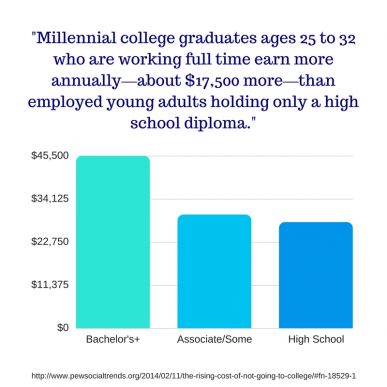
With the cost of college growing higher and the imminent fear of being in debt, students are questioning whether earning a college degree is worth it to get a job.
In a 2009 Pew Research Center survey, “73 percent of American adults agreed that, in order to get ahead in life these days, it is necessary to get a college education.”
Cabrini University alumnus, Anthony P. Grassia Jr., is the vice president of production management at IMS Technology Services, Inc. Grassia graduated from Cabrini in 2003 with a Bachelor of Arts in communication and English.
Grassia learned from his parents that an education is very important.
“My parents taught me a simple principle: education is power. A college education is more than acquiring knowledge and skill in a major, it empowers us to develop personally then professionally and prepares us to participate in and contribute to society,” Grassia said.
He believes that no matter the field everyone should get a college education because it gives an advantage.
“It shows you are willing and able to put the time, effort and money into your own personal growth. Knowledge is the key to success and it’s a priceless and continual journey,” Grassia said.
Among young adults, completion of a bachelor’s degree is up sharply over the last five years. In 2012, a record one-third of adults ages 25 to 29 have attained at least a bachelor’s degree, according to Pew Research.
Nicholas DiCampli was an associate recruiter at Lab Support. As a recruiter, he was responsible for connecting companies with those looking for jobs. Though there are many jobs that come in that do not require a degree, those that have a degree earn more money most of the time.
“Companies love seeing that college degree and definitely pay more to those who have one,” DiCampli said. “This shows a company that they have taken on the responsibility of all that college puts on you and can manage a full work load in my opinion.”
The unemployment rate is a lot lower among those with a bachelor’s degree compared to those with a two-year degree or high school diploma. “Millennial college graduates ages 25 to 32 who are working full time earn more annually—about $17,500 more—than employed young adults holding only a high school diploma,” according to Pew Research.
However, before deciding on whether to get a college degree, it is important to consider and research the career or field. Some fields may not require a college degree to succeed but training and experience may be enough.

Amanda Borthwick is the human resources generalist at Price Automotive Group. According to Borthwick, jobs in the retail automotive industry do not require college degrees.
“We are able to employ individuals who are willing to learn and train them in to positions. Degree or not, you can earn six figures as a successful sales associate or automotive technician,” Borthwick said. “In the automotive industry, a proven track record of success is going to take precedence over a degree.”
However, Borthwick did add that many companies in other industries do require a degree.
Both Grassia and DiCampli said that even if a student is looking to become a tradesperson, it still puts them at an advantage to have a degree on their resume.
The study from Pew Research also found that earning a college degree outweighs the heavy financial difficulty of paying for the education. 86 percent of millennials ages 25 to 32 who borrowed money to pay for school believes it was worth it.
“At the end of the day it doesn’t matter where or what you paid for your education, what matters most is the experience, knowledge and skills gained that separate you from the next person and make you better,” Grassia said.


